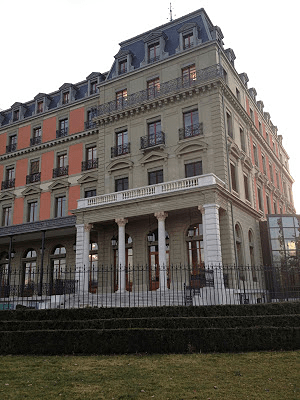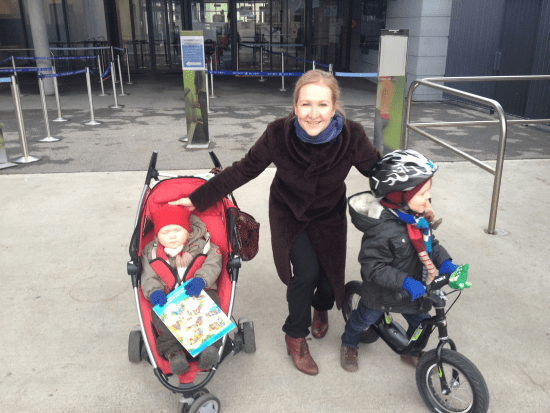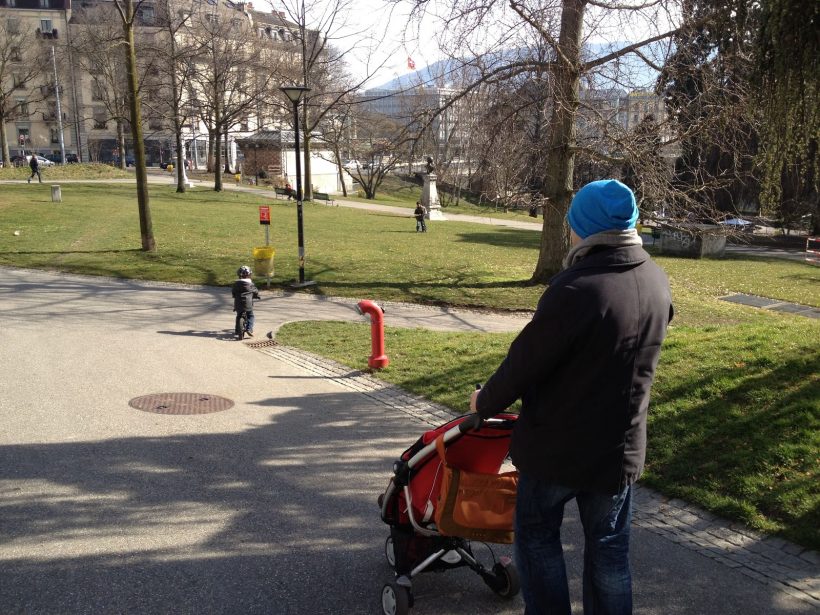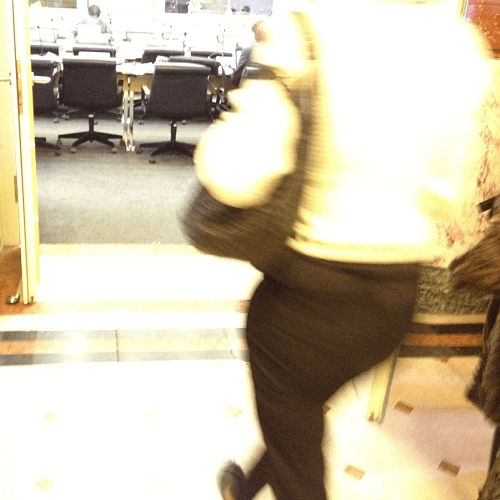Almost exactly four years ago I arrived at Geneva airport – with my two sons then aged 1 and 4. We had set on our journey almost a full day earlier, from the German town of Halle/Saale where I was working as a researcher at the MPI. The departure alone had been chaotic: we were packing for a three week stay because of the fieldwork I was commencing at the UN Human Rights Committee.
The timing of our departure was the most difficult imaginable: my husband had to be back home in Finland for his work, and the same applied to our valiant nanny who had otherwise accompanied us in our German stay, very marvelously so. Thus although I had ample support for my work in general, on that very travel, particularly from Berlin onward, it was just me and the boys.
The day before – finally, after the customary hours of manic running around – we had left our German home, ran for the tram, then the train, then the subway. My 4-year old on his kick bike, my 1-year-old in his stroller and me with full suitcase in addition.

We stayed overnight at my dear Allie Julie’s home, and she and her husband Ahmad treated us royally, once again. At night my 1-year old fell ill and threw up on our host’s beautiful rug. In my half-witted state I cleaned up to the best of abilities. Needless to say sleep was not really on the menu after that; my 1-year old had also gotten a fever by the time. It was likely yet another one of those infinite ear infections that he was prone to getting.
At some ghastly hour between yesterday and tomorrow I had to jerk all of us up, assemble our luggage, and drag us all in the cab that took us to the airport. At the chaos of the airport I ran around – with two understandably grumpy kids – trying to find some cardboard with which to wrap up our 4-year old’s kick bike. Bringing it along did not feel like the smartest of moves right then.
Feeling half-conscious myself I dragged the kids through endless-feeling corridors, which included numerous sets of stairs too. I did get some assistance, but people are not as helpful at such ghastly hours as you might think.
A short flight later (fortunately with no ear ache for the 1-year old!) we arrived in Geneva. I fetched our luggage, the stroller, the kick-bike and we headed toward the tram. Navigating through the unfamiliar city (not my strong suit) we eventually found our flat, and got all of us fitted in the tiny elevator. I was feeling delirious from exhaustion, yet mustering the last fragments of positive energy to keep my kids calm. Fortunately the younger one was feeling fine by that time, with no more fever or throwing up.
A few moments later we were greeted by someone who felt almost like a gift from some higher power: the former nanny of Jane Cowan’s kids to whom she had graciously connected me. The relief of having another adult share some of the responsibility felt like a weight had been lifted off me.
Next it was time to empty the luggage, try to sooth the kids while our nanny-on-loan helped us to get something to eat. Changing napkins, maybe a nap – I don’t remember any more – then scrambling toward the UN to fetch my badge so that I would be all set for my fieldwork at the UN session opening the next Monday. Off we were, all four of us – the mother-researchers, two kids and the nanny.
After much waiting around, chasing after the right building I finally got my badge – and we even made it back to our flat ok. A calm night, some sleep – and after my husband arrived the next morning all started to feel normal again.

As Carole McGranahan’s post emphasised yesterday, it is possible to be a mother and an anthropologist – but not without an extensive network of help, and more than just a whiff of stubbornness (and evidently madness).
For me this combination was most acute during the year 2013 when I was working in Germany, my husband had his work back home in Finland, and in addition we spent three three-week periods in Geneva for my fieldwork.
Just the stay in Germany alone was a push as my husband was travelling back and forth every other week. As said, we had the extraordinary luck of having a nanny who had been with us since both of our kids were born. Because our circumstances were so complicated and multi-local we had decided against putting the kids at a local German daycare – neither one of us was even fluent in the language.
Yet even with this combination of people there were ample moments when additional help was simply of the essence – our younger son was so small that very rare were the occasions when one could manage without direct adult supervision.

Thus during the year, when both my husband and our nanny were back home, I had my mother over numerous times, as well as my aunt. We even had a local helper who covered occasional baby-sitting shifts. And then there were other Allies too from the academic network: colleagues who welcomed us in their homes and those who tapped into their own networks to help us get support in times when it was direly needed.
Of course most of this is familiar to everyone doing fieldwork – the solidarity and helpfulness of initial strangers in moments of feeling and being totally lost is likely a much greater part of our fieldwork than we usually acknowledge.
And needless to say that all this speaks of incredible eliticism too: the luxury of having a nanny, and a spouse, helping out, of having parents and relatives who are capable of dashing to the scene – not to mention the luxury of even being allowed to do such mobile work, unobstructed by continually intensifying visa restrictions and unforeseen travel bans.
Yes, anthropology is the playing field of the globally privileged – and there is no denying this no matter how much we like to think that our political sensibilities are with the impoverished and the disadvantaged!
I do feel borderline embarrassed to think of even making a fuss of such travel details – realistically the journey wasn’t even that long! And of course I know fully well how many people are zigzagging around the world in infinitely worse conditions, with no certainty as to what their final destinations will become or how long it will get to reach it. Who are facing these journeys alone, without any knowledge over the whereabouts or safety of their families.
Simultaneously it feels crucial to elaborate what it means to be a professional anthropologist with kids, especially when they are small. The toll that it takes to make arrangements for fieldwork – for which one has two choices: either to accept that it means time away from family, or to endure the additional hassles that bringing family along will mean.
For my family the choice has so far been the latter, and in addition to Germany and Geneva we have spent time in New York and Johannesburg. This has been made possible by privileged research support that covered (at least parts of) the expenses. My husband’s patience has been amply tested – but on the bright side he does know quite a few good playgrounds in Manhattan.
Also my own patience has been duly tested as my fieldwork days have inevitably began and ended with intense child care shifts as my husband has crammed in his working hours in during the mornings and evenings. And of course there is the maternal guilt too – the feeling that this is all my fault when your kids cry from exhaustion or sleep restlessly as we settle on yet another new location.
All this been further aggravated by the nagging doubt – due to my vicarious professional situation characterised by temporary research positions – of will all this really lead me anywhere? Am I putting my family through all this in vain?! Of course there are other sides to these experiences too – the way in which they have undoubtedly enriched my kids’ perception of the world. But one will have to continue waiting to fully see that.
When I look back at these experiences now, when my boys are older and such manic transitions are behind us, I have no idea how I managed, or how we managed. I imagine that other fieldworking moms feel the say – one just gets things done as there is no alternative. Perhaps it’s safe to say that multitasking is one of our strengths as women anyway. How many working moms recognise themselves from the below skit, a response to the by-now viral video of a dad’s BBC interview gone awry?
Whatever the case, I do take some pride in saying, on behalf of myself and all others: the field-working mother is a type of a superwoman for sure!
There is also something very peculiar about reading my published works based on such fieldwork experiences: these texts have a very personal, emotional subtext running through the intellectual analysis of the surface. The affective connections that anthropologists have for our discipline is undoubtedly one of its defining features. These ties are nowhere as pronounced as when one’s data, description and analysis become intertwined so strongly with the personal – as Reetta Toivanen also noted in her post on doing fieldwork with kids.
And this comes also with added benefits, I will boldly argue. I may not be able to pinpoint exactly just which parts of my writing all this impacts, but I do know, beyond a doubt: I write differently now when I am an anthropologist and mother than I did before – and for this also the scholar in me has profound gratitude for the networks that make it all possible!
Miia Halme-Tuomisaari’s data that she gathered during these fieldwork stays in Geneva contributed significantly to her chapter ‘Embodied Universalism at the UN Human Rights Committee: Meeting the World at the Palais Wilson’ of the new book ‘Palaces of Hope: The Anthropology of Global Organizations’, edited by Ronald Niezen and Maria Sapignoli (CUP 2017). The book will be featured in a thematic week during this spring. Miia Halme-Tuomisaari shared glimpses into her fieldwork at the UN at Allegra in a series of posts in 2013.




